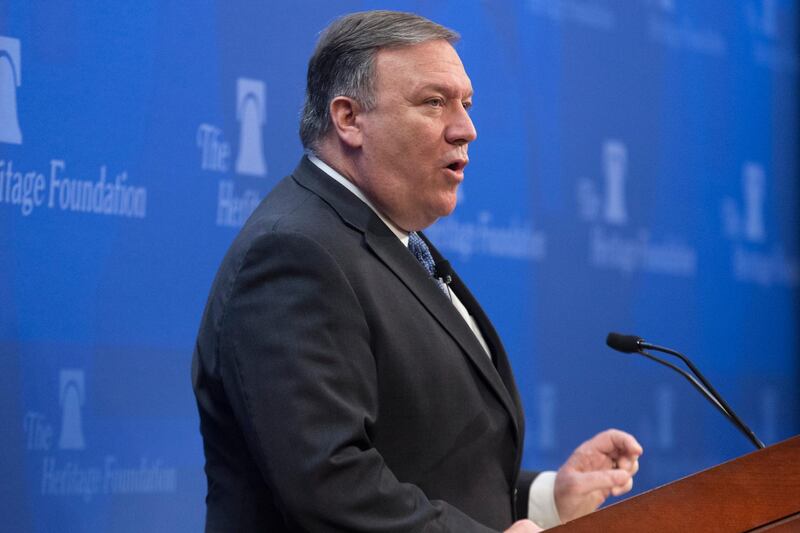After a decade or more of untrammelled growth, Iran’s Islamic Revolutionary Guards Corps (IRGC) is a greater economic force than many small nation states.
The Foundation for Defence of Democracies (FDD) think tank in Washington estimates that the IRGC controls 20 per cent of the Tehran stock exchange alone. No wonder Mike Pompeo, the US Secretary of State, warned Monday that US allies and trading partners “can’t generate wealth” for the paramilitary wing of the Iranian regime.
The renewed focus on Iran’s most powerful economic player is already having an effect on investment in Iran, according to economists and consultants who track the Iranian economy.
“It’s caused clients who are considering plans for entering the Iranian market to put those plans on hold. This is part of a bigger picture, including Israeli airstrikes on Iranian positions in Syria and rising tensions in the region,” said Allison Wood, an analyst at Control Risks. “Clients across the region are thinking carefully how this will affect their business and what are the worst case scenarios.
“Pompeo’s speech certainly makes clear that a rigorous regime of sanctions and additional measures will be imposed and this will include Iranian proxies and facilitators.”
_________
Read more:
Pompeo puts 12 demands on Iran: 'carte blanche' in the Middle East is over
EU says US has offered no alternative to Iran deal
Zarif meets EU leaders in effort to salvage nuclear deal
__________
American sanctions were only lifted when the Joint Comprehensive Plan of Action (JPCOA) started operating in 2016. Jonathan Schanzer, a former US Treasury official and sanctions specialist, believes the legal background for sanctions is now much clearer with the designation of the entire IRGC, not just its overseas operations, known as the Qods force.
Mr Schanzer believes the threshold for targeting companies with IRGC involvement will be set much lower to include board level representation and not just a beneficial ownership criterion.
The crackdown is likely to hit IRGC operations within weeks. “The Treasury has already done most of the heavy lifting on reimposition and there will be more new designations,” he said. “For the US it’s about prioritisation. There are quite a lot of possible targets, it’s about how to get the most important.”
For many, the effect of punitive penalties would be much greater if Iran would persuade European states to come onboard.
“America’s new strategy also presents European leaders with a choice: Either help curb all of Iran’s malign activities in exchange for major American economic and diplomatic concessions, or cast their lots with the repressive theocracy responsible for a 2012 terror attack in Bulgaria, and for the bloodshed in Syria that created a refugee crisis in Europe,” wrote Mark Dubowitz, the FDD director, in response to the Trump speech.
Even those who praise the European decision to stay in the JPCOA concede that Washington’s concerns over the Iranian role in the region is shared by its allies.
A report issued by the European Council on Foreign Relations (ECFR) on Tuesday warned that the region was divided along battle lines that had deepened after the American decision.
“Europe is not neutral in this regional struggle. It has deep-rooted military and economic ties to all countries in the anti-Iran front that dwarf its relations with Tehran. France, Germany, and the United Kingdom strongly object to what they perceive as Iran’s: destabilising role in Syria, especially the threat it poses to Israel; backing of Shia militias in Lebanon and Iraq; support for Houthi fighters in Yemen; and involvement in missiles proliferation in the region,” the ECFR researchers noted.
Washington’s decision to put economic pressure back on Iran remains controversial among policy makers and others. Critics see the sanctions as a blunt instrument that harm the general economy while elevating the role of the IRGC. Thus Mr Pompeo faces warnings that his approach could backfire among those that America needs as friends in Iran, the aspirational middle class.
“The restored and new sanctions the United States is imposing on Iran will vastly increase the suffering of Iranians while not denying Iran’s Islamic Revolutionary Guard Corps the relatively small amount of funds needed to continue its interventions in the region,” wrote Barbara Slavin, an Iran-watcher on the Atlantic Council. “Indeed, the sanctions will boost the IRGC’s role in the economy to the detriment of private enterprise and especially the bright young college graduates seeking a better life in Iran.”






